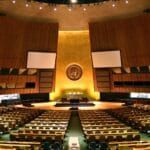On Thursday, in a teleconference sponsored by the Bulletin of the Atomic Scientists, nuclear weapons expert Henry Sokolski discussed his recent book "Underestimated: Our Not So Peaceful Nuclear Future." The book's central thesis is that if "states become more willing to use their nuclear weapons to achieve military advantage … US security may become hostage to nuclear proliferation" and a number of other dangers.
Sokolski—executive director of the Nonproliferation Policy Education Center in Arlington, Virginia—explained in the teleconference that his book examines trends since the Cuban Missile Crisis in deployed nuclear weapons, fissile material stockpiles, and other arenas. Regarding deployed weapons, Sokolski identified a trend toward "compression" in the relative sizes of nuclear arsenals. At the time of the Cuban Missile Crisis, the world's largest nuclear arsenal contained as many as 24,000 weapons. The smallest arsenal for which "arsenal" was an appropriate term contained about 50 weapons. In comparison, Sokolski said, "the United States and Russia have roughly several thousand" nuclear weapons today, whereas the smallest arsenal worthy of the name contains about a hundred weapons.
A second trend is the amount of material in the world that could be "fashioned or refashioned" into nuclear weapons. In 1962, Sokolski said, essentially all nuclear material was absorbed into military applications right away. Today, Russia and the United States have stockpiles containing tens of thousands of bombs' worth of uranium and plutonium—while China is estimated to have nearly 1,000 bombs' worth of fissile material and "even Japan has roughly 1800 bombs' worth of plutonium stockpiled." This is a "different world," Sokolski argued, in which it might be possible for nations with smaller arsenals to undertake a "sprint to equality" in nuclear weapons.
Sokolski presented a series of "common sense" prescriptions for avoiding nuclear danger. These include orienting military and foreign policy toward the goal of "fewer … weapons in fewer hands." He argued for the United States to focus arms control efforts on Asia because "the center of gravity is shifting in that direction," and he characterized China as "the main event." While conceding that China doesn't possess a vast nuclear arsenal today, he observed that Beijing is acquiring many missiles. "We need to talk more about missiles and their control," Sokolski said. He also argued strongly against plutonium reprocessing in China—and in Japan.
Sokolski urged officials to act on proliferation problems "before [they] have clear proof" in order to avoid later measures as "desperate as military action or a covert operation." He also argued that US diplomacy needs to utilize international law more effectively—indeed, that "each country should serve its own purposes by figuring out rules that apply to everyone." If Sokolski's prescriptions turn out to be "overly ambitious," he said, the warnings contained in his book "may begin to look more like predictions."
A podcast of the teleconference—including both Sokolski's initial presentation and the question-and-answer session that followed—is available here.
Together, we make the world safer.
The Bulletin elevates expert voices above the noise. But as an independent nonprofit organization, our operations depend on the support of readers like you. Help us continue to deliver quality journalism that holds leaders accountable. Your support of our work at any level is important. In return, we promise our coverage will be understandable, influential, vigilant, solution-oriented, and fair-minded. Together we can make a difference.
Topics: Nuclear Weapons















